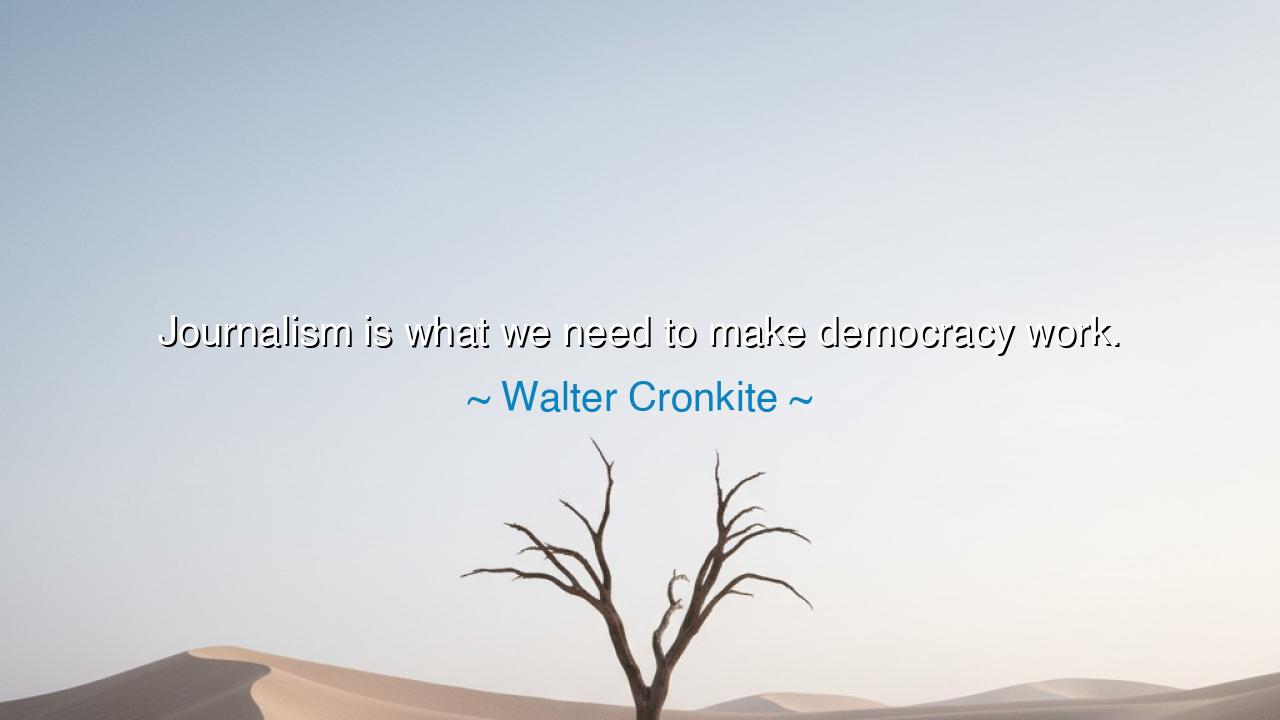
Journalism is what we need to make democracy work.






The words of Walter Cronkite—“Journalism is what we need to make democracy work”—resound like a trumpet of truth echoing through the ages. They remind us that freedom is not a flame that burns by itself, but one that must be fed by knowledge, guarded by vigilance, and kept alive by the courage of those who seek and speak the truth. Without journalism, the people walk in darkness; with it, they see the path before them.
The ancients knew that power unchallenged becomes tyranny, and that ignorance is the chain that binds the masses. Thus, the scribes of old, the heralds in the city squares, the chroniclers of battles and councils—all were precursors to journalism, for they carried truth from the few to the many. Cronkite’s words remind us that this tradition did not die but was reborn in the modern world, where the voice of the free press stands as the shield of democracy.
To say that journalism makes democracy work is to proclaim that self-rule depends upon the people’s right to know. The ballot cast blindly is not freedom but illusion; the voice raised without knowledge is but an echo without substance. Only when truth flows freely can justice prevail, and only when facts are spoken boldly can the people govern themselves with wisdom.
This truth is not gentle—it is heroic. For journalism is not merely ink on paper or words on a screen; it is a battle against silence, a defiance of corruption, a fire kindled against deceit. The journalist stands where fear would silence others, daring to uncover what the powerful would bury. In doing so, they safeguard the very soul of democracy, for without truth, liberty decays.
So let this teaching endure: honor those who bring you the truth, for they are the unseen warriors of freedom. Guard journalism as you would guard the temple of justice, for it is the vessel through which the people see, hear, and know. And remember always that a democracy without truth is no democracy at all—it is but a shadow, waiting for the light.






BLba long
This quote brings to light a fundamental aspect of a democracy—the need for transparent, factual reporting. But in an era where opinions often blur with facts, how can we distinguish between genuine journalism and sensationalism? Can journalists still effectively uphold democracy in such an environment, or has the nature of the media landscape changed too much?
LPLinh Pham
Walter Cronkite’s quote really highlights how vital journalism is for a healthy democracy. However, with the rise of fake news and biased reporting, how do we ensure that journalism remains a reliable source of truth? Do you think the public's perception of media has changed, and how can journalists regain the trust of a skeptical audience?
TQNguyẽn Võ Tán Quang
This quote emphasizes journalism’s importance, but I wonder if journalism today has strayed from its true purpose. With the influence of social media and the growing polarization in the news, can we still trust that journalism is making democracy work? What do you think is needed to restore public trust in the media?
QMNhat Quang Mai
Walter Cronkite’s statement really makes you think about the essential role of journalism in a functioning democracy. But with so many media outlets today, can we truly rely on them to provide unbiased and factual news? What responsibility do journalists have in ensuring that democracy is served through their reporting?
SDSon Duy
I completely agree with Walter Cronkite’s view on journalism. In a democracy, people need accurate, unbiased information to make informed decisions. How do you think journalism can maintain its role in democracy in today’s digital age, with the rise of misinformation? Do you think the media is fulfilling this responsibility or has it become more about entertainment and clicks than truth?